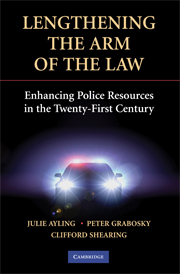3 - Coercion
Published online by Cambridge University Press: 05 June 2012
Summary
INTRODUCTION
The use by the state of coercive measures to ensure that its citizens assist it in law enforcement has a long history. What was to become the monopoly of the state over legitimate physical violence (Weber 1919 [1974]: 311) was exercised in medieval England by its individual citizens. Every man had a responsibility to secure his own neighbourhood through the obligation to join in ‘the hue and cry’ and to keep in his house a stash of arms for the specific purpose of maintaining the peace. Judgment against an apprehended criminal was carried out not by a formal court system but by citizens themselves, and was summary, swift and usually brutal. Under Edward I's 1275 Statute of Westminster, whole villages could be fined if they failed to bring the perpetrator of a criminal act to justice (Blue 1992: 1480–81). With the advent of organised police forces in the nineteenth century, the obligation of citizens to ensure enforcement of the law through personal action gradually diminished. The police, as agents of the state, became the wielders of the capacity to use physical force and this capacity remains at the core of the public police role today (Bittner 1970). Although the obligation to legally inflict violence on one's neighbour at the state's behest largely disappeared with the ‘hue and cry’, the state still frequently obliges citizens to assist it in enforcing the law.
- Type
- Chapter
- Information
- Lengthening the Arm of the LawEnhancing Police Resources in the Twenty-First Century, pp. 48 - 71Publisher: Cambridge University PressPrint publication year: 2008



